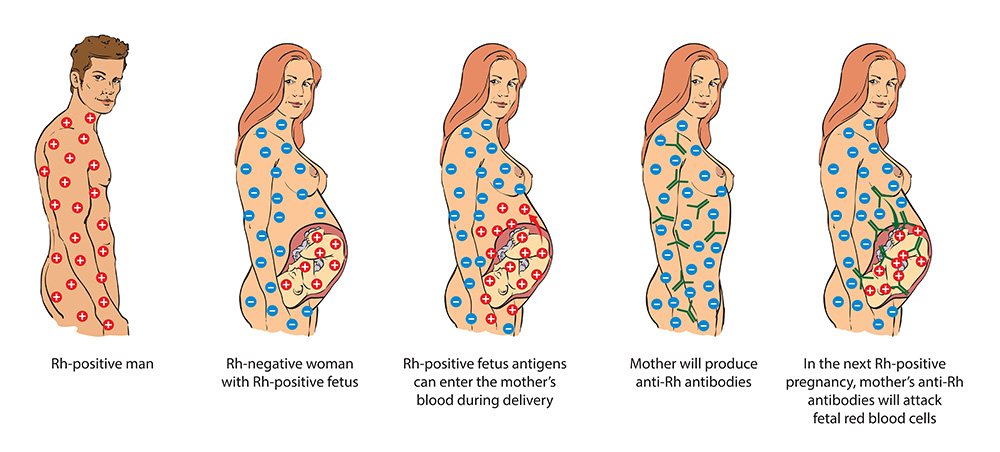
Summary
What are blood groups and why are they important?
Your immune system protects you by making antibodies to attack substances that should not be in your body and could be harmful to you. This includes infections like viruses and bacteria as well as toxic substances. It does this by targeting special markers called antigens which are found on the surfaces of most cells.
Your blood cells have marker antigens on their surface. Blood is made up of different cells including red blood cells, white blood cells and platelets suspended in a liquid called plasma.
The surface of every red blood cell is coated with these marker antigens. Everyone has their own set of antigens which are inherited from their parents. There are about 30 blood group types, but A, B, AB and O are the most common.
| Blood type | Antigens |
| Group A | A antigens |
| Group B | B antigens |
| Group AB | A and B antigens |
| Group O | No A or B antigens |
Rhesus D (RhD) factor
Each of these blood types is then further grouped according to whether your red blood cells have the Rhesus D (RhD) marker antigen, also known as RhD factor.
If you are RhD-positive your blood cells have RhD antigens. If you are RhD-negative, your blood cells do not have the RhD antigen.
Why get tested?
As a normal part of pregnancy screening, it will be important to find out your blood group type and whether you are RhD positive or negative.
Blood cells with marker antigens that are different from your own can be attacked by your immune system.
If you are RhD-negative and the father of your baby is Rh-positive your baby can inherit RhD-positive blood from their father.
In this situation, your immune system can attack the baby’s blood by making anti-RhD antibodies. These antibodies destroy red blood cells that are different from your own. Your immune system sees the baby’s RhD-positive cells as foreign. This is called RhD incompatibility.
RhD incompatibility is not common. Most people are RhD-positive and only those pregnant women who are RhD-negative are at a risk.
First or subsequent pregnancy?
RhD incompatibility is usually not a problem if this is your first pregnancy. This is because your baby's blood would not normally enter your own blood system. It is during the birth that your baby’s blood is most likely to mix with yours.
In this first pregnancy and you and your baby are RhD incompatible, your body does not have a chance to make a lot of antibodies and so there will be no issues. However, if treatment is not given and if in future you carry another baby with different RhD factor to your own, your antibodies may recognise your baby's blood cells as foreign and attack those cells.
Haemolytic disease of the fetus and newborn
The condition in which the baby’s RhD-positive red blood cells are attacked and destroyed is called haemolytic disease of the fetus and newborn (HDFN).
This is serious type of anaemia in which the baby’s red blood cells are destroyed faster than the body can replace them.
In severe cases of HDFN, the baby may be born with anaemia, jaundice, heart failure or even be still born. To ensure that these issues do not arise, an antenatal group and screen is used to:
Having the test
Sample
Blood.
Any preparation?
None.
Your results
Result What this means Negative result No red blood cells antibodies were found but you may still be given treatment if it is thought you could make antibodies. Positive result You have red blood cell antibodies in your blood. You may need more tests to find out what type of red blood cell antibodies you have. You may have more frequent tests during your pregnancy to check the health of your baby.
Treatment
If antibodies are found, your medical team will monitor your pregnancy to reduce any risk. You will be given RhD immunoglobulin (known as Anti-D) injections to prevent your immune system from developing antibodies:
Once you have red blood cell antibodies, they stay with you for life.
Other antibodies
Other antibodies may also develop if you and your baby have different blood group antigens. These need to be found and may also be monitored during your pregnancy if the antibody present can cause HDFN.
Questions to ask your doctor
The choice of tests your doctor makes will be based on your medical history and symptoms. It is important that you tell them everything you think might help.
You play a central role in making sure your test results are accurate. Do everything you can to make sure the information you provide is correct and follow instructions closely.
Talk to your doctor about any medications you are taking. Find out if you need to fast or stop any particular foods or supplements. These may affect your results. Ask:
More information
Pathology and diagnostic imaging reports can be added to your My Health Record. You and your healthcare provider can now access your results whenever and wherever needed.
Get further trustworthy health information and advice from healthdirect.
What is Pathology Tests Explained?
Pathology Tests Explained (PTEx) is a not-for profit group managed by a consortium of Australasian medical and scientific organisations.
With up-to-date, evidence-based information about pathology tests it is a leading trusted source for consumers.
Information is prepared and reviewed by practising pathologists and scientists and is entirely free of any commercial influence.